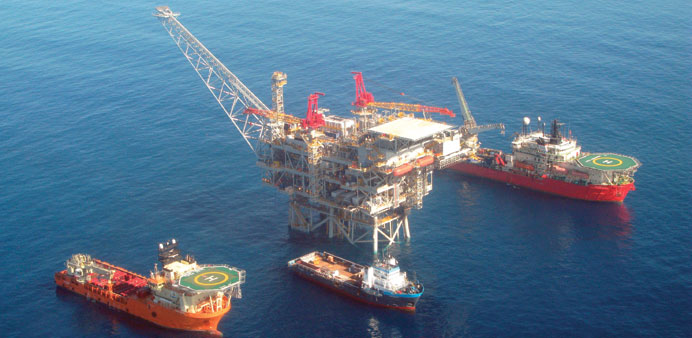An undated handout picture provided by Albatross Aerial photography yesterday shows an aerial view of the Israeli gas rig Tamar. The field is located 90km off Israel’s northern coast and has an estimated 10tn cu ft of gas.
Dow Jones, Reuters/Jerusalem
Natural gas from Israel’s offshore Tamar field began to flow into the country’s energy grid yesterday after two years of a gas shortage. The gas will allow Israel to be energy independent for at least three decades, in addition to becoming a net exporter of gas, according to the Ministry of Energy and Water Resources.
The gas production from Tamar is also expected to add about 1% to Israel’s economic growth this year, according to the Bank of Israel. Taking the gas production into account, gross domestic product is expected to grow 3.8% in 2013; without the gas, GDP would only grow 2.8%, the bank said. In 2012, GDP grew about 3%.
“This is an important day for the economy of Israel,” Prime Minister Benjamin Netanyahu said in a statement. “This is something that will enhance the economy of Israel along with all the citizens of Israel.”
Most of the gas from Tamar, which contains an estimated 10tn cu ft of gas, will initially be used by the state-owned electric company. The electric company is currently in debt and has had to raise prices recently due to a gas shortage since a supply deal with Egypt fell apart in the wake of political regime change there. Since gas stopped coming in from Egypt in 2011, the electric company has had to rely on more expensive forms of fuel, including diesel.
“Today (we begin) independence in Israeli natural gas. It is an enormous achievement for the Israeli economy and the start of a new era,” said Israeli billionaire Yitzhak Tshuva, the controlling shareholder in Delek Group, one of the partners in Tamar.
Israel recently created a sovereign wealth fund for profits from the gas in Tamar and the nearby larger Leviathan field, which is scheduled to begin production later this decade.
Stakeholders in Tamar include Delek Drilling Ltd Partnership and Avner Oil Exploration Ltd Partnership, both subsidiaries of Delek Group Ltd, which each hold a 15.6% stake; Isramco Negev 2 LP, which holds 28%; and Houston-based Noble Energy Inc, which holds 36%.
A statement from the production partners, who said they had invested $3bn in developing Tamar, estimated the new gas supplies would save Israel’s economy, which relies heavily on oil imports, 13bn shekels ($3.6bn) per year.
Noble Energy Chairman and CEO, Charles Davidson, said bringing Tamar to production in four years was a “transformational achievement” and that the field’s partners would now work to invest in increasing piping capacity.
“Building on this success, we will work with our partners and the government to sanction the next phase of development at Tamar and the domestic phase of Leviathan,” Davidson said.
Tamar is located 90km off Israel’s northern coast. Development of Tamar and Leviathan will make Israel less dependent on energy imports but the country has said it will also allow a significant amount of its natural gas to be exported.

